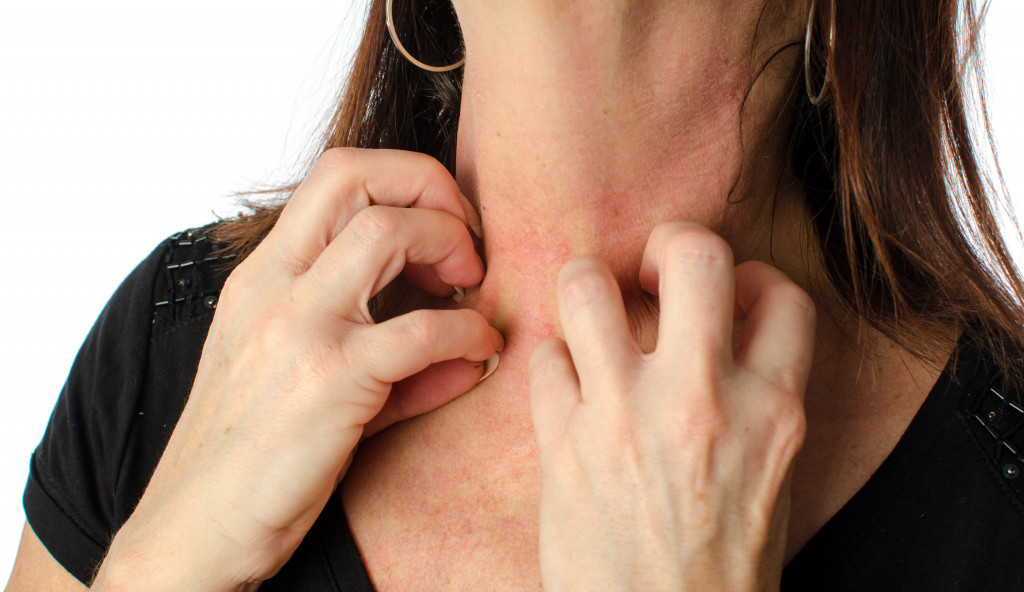- Eczema is an inflammatory skin condition that affects more women than men.
- Hormonal changes, stress, harsh skincare products, and weather changes can make women more prone to eczema.
- Genetics can also play a role in the severity of eczema symptoms.
- Keeping clothes and skin clean and moisturizing regularly is essential to prevent eczema flare-ups.
- Consult a doctor for advice on managing eczema effectively.
Eczema is a skin condition that affects millions of people worldwide, and women are more susceptible to it than men. Eczema causes inflammation and dry and itchy skin and can be aggravated by various triggers. Although anyone can suffer from eczema, women are more prone to develop the condition due to several factors. Here’s a deeper look into eczema, the causes of why women are susceptible to it, and what you can do to prevent it.
What is Eczema?
Eczema is a chronic inflammatory skin condition. It is characterized by inflamed patches of skin that can sometimes develop into blisters or scales. Eczema is a common condition that affects people of all ages,
The exact cause is believed to involve genetic and environmental factors. People with eczema have a compromised skin barrier, which allows irritants and allergens to penetrate the skin more easily, triggering an immune response and inflammation. Here are some reasons why women tend to have this skin disease more than women:
Hormonal Changes
One of the primary reasons why women are prone to eczema is because of hormonal changes. Hormones in women can fluctuate during their menstrual cycles, pregnancy, and menopause. These hormonal imbalances can trigger eczema flare-ups or make existing eczema symptoms worse. Women who are pregnant may experience heightened eczema symptoms due to hormonal changes, while women who are going through menopause may have eczema develop for the first time due to hormonal fluctuation.

Stress
Stress can trigger various physical and mental health issues, including eczema. Women tend to take on many responsibilities, and the pressure of balancing work, home, and family life can lead to stress. Stress affects the immune system, making it easier for eczema to flare up and become severe. Managing stress by engaging in relaxing activities such as yoga, meditation, or regular exercise is essential.
Harsh Skin Products
Women are more likely to use skincare products such as cleansers, toners, and moisturizers that can irritate the skin and trigger eczema. Products with fragrances, sulfates, and alcohol can strip the skin’s protective barrier, leading to dryness and eczema. It is essential to use mild and gentle products specifically formulated for sensitive skin types. Always check the product ingredients and avoid those that contain harsh ingredients.
Weather Changes
Women’s skin tends to be more sensitive to changes in weather, particularly extreme temperatures. Cold, dry air can lead to eczema flare-ups, while sunny and hot weather can cause sweating, leading to skin irritation. It is essential to keep the skin hydrated by applying moisturizer and drinking lots of water during hot and cold weather.
Genetics
Genetics plays a significant role in eczema. Women with a family history of the condition are more prone to develop it. Researchers believe that eczema has a genetic link, and specific genes are responsible for causing the condition. Genetics can also determine the type and severity of eczema. Women with a family history of eczema should take preventative measures to ensure their skin is appropriately cared for.
Preventing Eczema
Thankfully, there are several steps women can take to prevent eczema flare-ups. These include:

Keep Your Clothes Clean
Viruses can sometimes stick to your clothes, and this can cause viral eczema. Clean and dry your clothes regularly to prevent viral eczema. If you don’t have the time to do this, consider hiring a reputable dry cleaner near you. They can sterilize your clothes and help reduce the chances of developing eczema.
Keep Your Skin Clean
Keeping your skin clean is essential by regularly washing it with mild and gentle cleansers specifically formulated for sensitive skin. Avoid harsh ingredients such as sulfates, fragrances, and alcohol, which can further irritate the skin. Also, avoid long showers and hot water; these can strip the skin of natural oils and cause dryness.
Moisturize Regularly
Dry skin is one of the primary triggers of eczema, so it’s essential to keep your skin hydrated by moisturizing regularly with lotions or creams specifically designed for sensitive skin. Look for products that contain ceramides or fatty acids to help restore the skin’s protective barrier.
Eczema is a common condition that affects millions of people, especially women. Understanding what causes eczema and taking preventive measures can help reduce flare-ups and improve overall health and well-being. If you’re concerned about developing eczema, consult your doctor for advice on managing the condition effectively.






